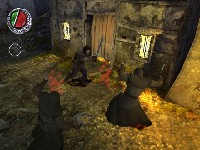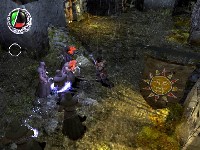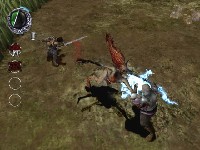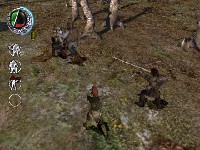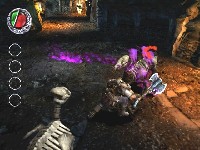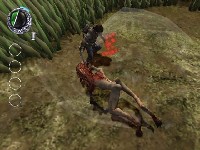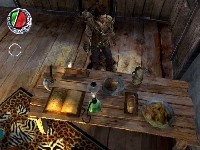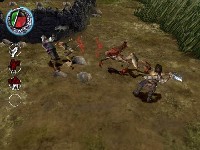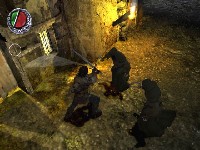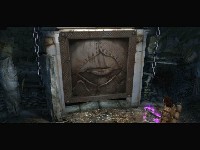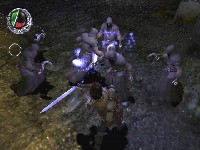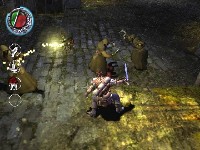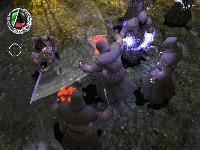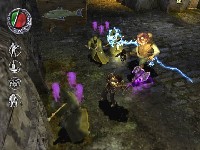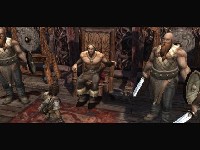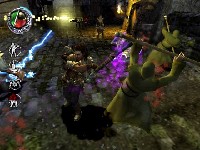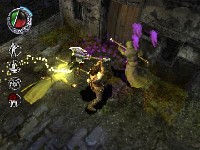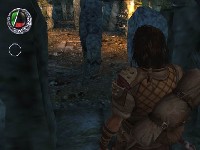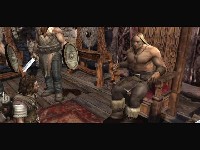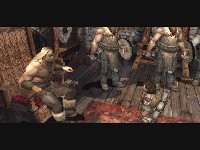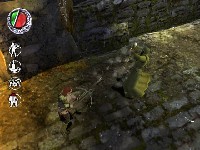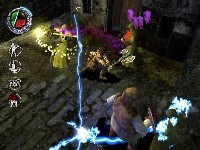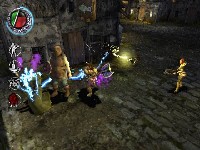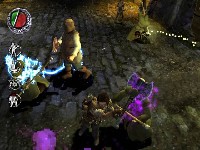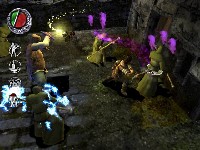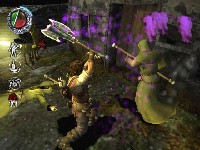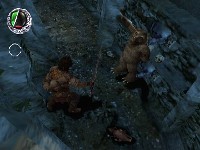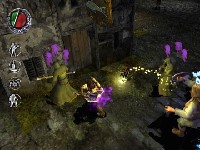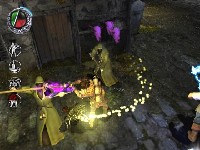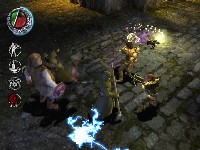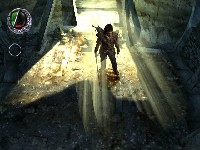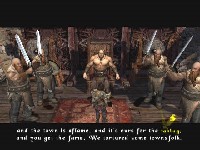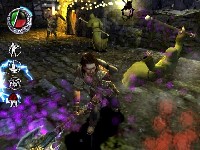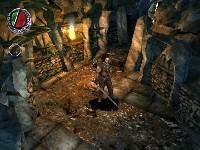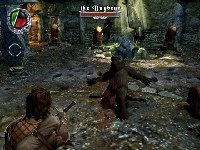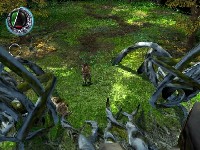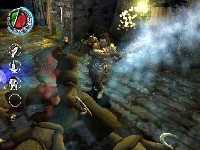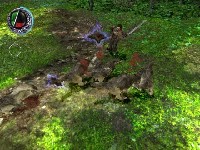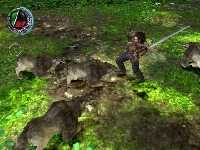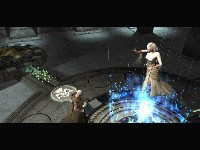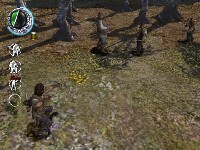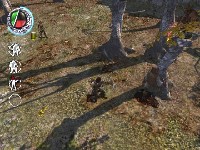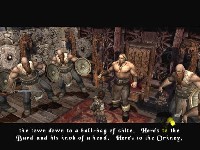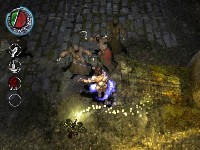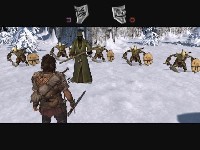Buy 'THE BARD'S TALE': Xbox | PlayStation 2
You know you are in for a treat when a game’s website makes you laugh so hard, you almost blow Jack & Coke out your nose. Doing preliminary research on this title, I went to their site, and was greeted with a flash menu featuring the bard and a few other characters from the game. When I clicked on the buxom maiden’s cleavage, she slapped my hand away. I thought this was just a cute thing, until I did it about five more times, and the website redirected me to a page dedicated to stopping sexual harassment. True story!
Loyal readers, you have, over the last seven months or so, heard me go on and on about voice talent in a lot of my reviews. Let’s face it; the tone of characters can often influence the overall tone of the game. Nowhere is this truer than in the world of heroic fantasy. By its very nature, the dialogue in a medieval (or thereabouts) fantasy games is stilted, heavy-handed and clichéd. So, the only way out of this vicious cycle is by making the style work FOR you! In this area, above all others, the newest incarnation of the old Old OLD CRPG (which many regard as their first), The Bard’s Tale wins, places and shows!
To truly capture the style of the heroic fantasy genre, one must embrace the very hackneyed expressions and old-hat snipes, and make the tone their own. In the movies, no one captured this better than Cary Elwes playing the “Dread Pirate Wesley” in Rob Reiner’s “The Princess Bride.” Well, hats off to InXile for hiring the selfsame Mr. Elwes to voice the bard because no one could have been more perfect. Taking on a much more common brogue than his cinematic posh accent, Elwes makes this game a rarity: a heroic fantasy game with true wit!! Let’s face it gang, most heroic fantasy games are oh-so-serious. Maybe, just maybe, a Schwarzenegger-esque quip will be uttered after the disembowelment of an orc, but otherwise, the protagonists in most CRPGS are stiffer than Richard Simmons watching a “Queer as Folk” Marathon.
Okay, enough aimless adoration for voice talent. Come to think of it, enough aimless potshots taken at Richard Simmons as well. But I digress….
Anyone who has played CRPGs for as long as I have will instantly recognize the name The Bard’s Tale. For a lot of us, we “broke cherry” with that relic. It had mazes, monsters, a recognizable character system and a sense of humor. There was enough hack and slash to satisfy the bloodthirsty, but the true nature of the BT games has always been the use of music. As a musician myself (guitar for 33 years), that always tickled me. This theme continues nicely in the latest incarnation as well, since the bard can use his various instruments to summon party members to fight alongside him.
The action, I will admit, is fairly familiar. In a quasi-top-down view with a rotating camera, you control the bard and his minions. The left analogue stick moves our sullen hero, while the right swings the camera. Zooming in is possible, but really doesn’t go far enough in to get a true look at characterization, and can actually be troublesome when confronting multiple enemies. Attacks and jumps are executed with the four buttons, and the shoulder buttons are used to change inventory and summon helpers. The control scheme is familiar, easy to understand, and works well when trying to change weapons or minions “on the fly.” If you’ve played Diablo or Baldur’s Gate – Dark Alliance, you’ll get the feel of this one immediately.
Mapping is nicely done with the use of the R3 button. Clicking on it allows you to cycle between a full-screen (but still semi-transparent) map, a mini-map with compass rose, or no map at all. This is also great when trying to navigate on the fly.
Character progression is handled in the tried-and-true experience point formula, with each level allowing you to tweak the bard’s stats and earn him more skills, more songs, the ability to summon more minions, etc. The skills are about what you’d expect; sword and dirk fighting, two-handed weapons, flails (which are unblockable, but slow), the ability to train your (seemingly indestructible) puppy to attack, and others too numerous to mention in this brief passage.
Music, as I hinted earlier, is integral not just to gameplay, but to the overall environment of the game. There are a number of full-length pub-style songs presented by all-singing, all-dancing denizens of the fantasy realm. As far as gameplay goes, the songs are your key to summoning your party members. Initially, you can only summon and control one minion at a time with your lute, but greater instruments allow larger quest parties. The summoned comrades are many and varied. Healers, Electric Spiders, Amazonian Sharpshooters and more are but a song away. You are constantly looking for instruments and songs along your way to rescue a beautiful princess trapped in an impenetrable tower. How cliché. Yep, and the game recognizes that it’s a cliché and runs with it! Down to a voiced “Once upon a time…” styled narrator who constantly insults and verbally spars with the bard. This interaction is a great addition to a game of this type and has a certain “breaking down the fourth wall” vibe to it.
The interaction between the bard and NPCs is done via a choice between replying in a sullen, sarcastic tone, or in a more pleasant, yet still sarcastic tone. Nicer isn’t always better, however, so size up your quarry before jumping to the wrong conclusion. A lot of times, a show of strength is infinitely better than supplication.
The level design is also pretty standard, if a bit linear for my tastes. It’s almost as if the designers didn’t want to challenge us too much on that front. There are definitely branching paths, but you mostly end up in the same place anyway. This can work to the players’ advantage if one is looking to find every little secret in the game, as you can clear an entire level before crossing a door into another.
Additionally, the quests are of the standard “I’ll let you have (a) if you bring me (b), but to get (b), you first need to get (c) from the evil (d)…” variety. You’ve seen it, you’ve played it, and the formula still holds up. For me, at least.
The dialogue is where this game really shines. It’s snappy, witty, and refreshing. How many times have you sat at the terminal, listening to blather, and you start being snide and talking to the screen in a condescending manner? I know I do it a lot when confronted with the kind of lame script so many CRPGs have. In this game, the bard is always a half-step ahead of you, treating morons like morons and calling a spade a spade.
I realize that this has been a pretty back-and-forth review. I feel like, at any moment, President Bush will accuse me of flip-flopping. I can only defend myself by saying that The Bard’s Tale is a guilty pleasure for me. It’s not a fantastic game, but I am having so much fun playing it, I am recommending it to everyone with a sense of humor. It’s also a good introduction to the genre for anyone who may have never tried one before. I like to think that you can really dislike things that are of high quality, and by the same token, be entranced by something more mediocre. I think Salieri himself would be pleased with that alliteration.
In the final analysis, I have to admit that nothing in the mechanics of The Bard’s Tale is revolutionary. The look, feel and everything from a programming standpoint you can think of, is all culled from the history of CRPGs. In that sense, I feel that this Bard’s Tale is an homage to that style that launched once upon a time. Just as “Kill Bill” is a love letter to the chop-socky movies of the 70’s, so The Bard’s Tale is a love letter to the old school CRPGs.
I can’t praise its groundbreaking gameplay mechanics, I can’t gush over its unreal sense of reality, I can’t be breathless about its mind-blowing lighting effects, but I can tell you this: This is the most fun I have had with a role-playing game in a very long time. It drips with an attitude that is wonderfully anarchic and cynical. It eschews the heroic knight in shining armor in favor a more “normal” hero, one that cares mostly for two things, coin and cleavage, and that can’t be a bad thing in my questbook.
Score: 8.0/10
More articles about The Bard's Tale



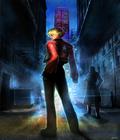

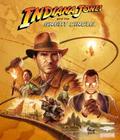
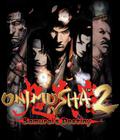

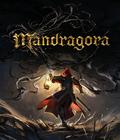
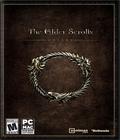

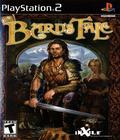 The Bard's Tale eschews RPG cliches in favor of intelligent humor for an original and truly entertaining experience.
The Bard's Tale eschews RPG cliches in favor of intelligent humor for an original and truly entertaining experience.